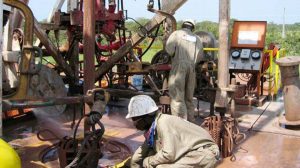The recent plunge in crude oil prices to less than $30 per barrel, from an average of $58 has been attributed to the drop of the fuel pump price by the Federal Government of Nigeria.
Announcing the reduction, the Minister of State for Petroleum, Timipre Sylva explained that the drop in crude oil prices has lowered the expected open market price of imported petrol below the official pump price of N145 per litre.
“In view of this situation, based on the price modulation template approved in 2015, the Federal Government is directing the Nigerian National Petroleum Corporation (NNPC), to reduce the Ex-Coastal and Ex-Depot prices of PMS to reflect current market realities.” He said.
Saudi Arabia, the World’s biggest oil exporter started a price war with Russia by slashing its selling price and pledging to unleash its pent-up supply onto a market reeling from falling demand because of the coronavirus outbreak affecting major economies in the world.

Russia had supported the Organisation of Petroleum Exporting Countries (OPEC) calls for cuts to stabilize falling prices caused by the economic fallout from the coronavirus outbreak.
However, Saudi Arabia’s plan to boost crude output above 10 million barrels per day (BPD) poses an imminent danger for other exporting countries like Nigeria.
Saudi Arabia had however announced massive discounts to its official selling prices for April, and the nation is reportedly preparing to increase its production above the 10 million barrel per day mark, according to a Reuters report. The kingdom currently pumps 9.7 million barrels per day but can ramp up to 12.5 million barrels per day.
PPPRA Explains New Template
The Executive Secretary of the Petroleum Pump Price Regulatory Agency (PPPRA) Abdulkadir Saidu has explained how the agency arrived at the new price.
He said that the cost and freight and charges were set at N99.44 per litre. Also factored into this are the landing cost at N108.18; lightening expenses N2.75; Nigerian Ports Authority (NPA) – N0.84, and the Nigerian Maritime Administration and Safety Agency (NIMASA) charge (N0.22); jetty thru’ put charge (N0.60); Storage charge (N2.00); financing (N2.33) and total distribution margin payable to petroleum product marketers at N19.37 per litre.
He said the average expected open market price (EOMP) for the months of January and February 2020 stood at about N175.52 per litre and N156.02 per litre respectively.
COVID-19 Impact
The outbreak of Coronavirus has slashed China (one of the worse hit countries of the epidemic) oil demand more up to 20%, and most OPEC members like Saudi Arabia are pumping out more barrels in the hope of compensating for the rapid decline in prices. The uncertainty has been devastating to oil markets, with the lack of coordination and trust amongst key OPEC and non-OPEC actors, fueling a new era of volatility.

For Nigeria, an OPEC member, its path to quickly ramp up production is limited by operational, regulatory and infrastructure challenges. While non-oil GDP growth has shown welcome signs of improvement in recent years, close to 90% of Nigeria’s FX revenues still come from oil exports.
